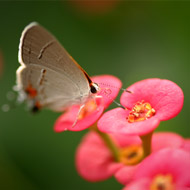Study reveals huge fall in flying insect population

The total biomass of flying insects has decreased 76 per cent since 1989.
Over three-quarters of the total insect population has been lost in protected nature reserves, according to a new study.
Researchers studied 63 nature reserves in Germany and found that the total biomass of flying insects has decreased 76 per cent since 1989. While the decrease was expected, it turned out to be more severe than first thought.
The study was led by ecologists from Radboud University together with the University of Sussex and Germany’s Krefeld Entomological Society. The results are published the journal PLOS ONE.
"All these areas are protected and most of them are managed nature reserves. Yet, this dramatic decline has occurred,” commented Caspar Hallmann, who performed the statistical analyses.
The exact causes of the loss are not yet understood. One theory is that because the research areas are small and bordered by farmland, the surrounding areas inflict flying insects and they cannot survive there.
“It is possible that these areas act as an ecological trap and jeopardise the populations in the nature reserves,” explains Hallman. It is possible that the results are typical for other parts of the world - and large areas of Europe - where nature reserves are surrounded by agricultural landscape.
The team hopes the findings will act as a ‘wake-up call’ and give rise to more research into the causes and encourage long-term monitoring.
"The only thing we can do right now is to maintain the utmost caution. We need to do less of the things that we know have a negative impact, such as the use of pesticides and prevent the disappearance of farmland borders full of flowers,” explained project leader Hans De Kroon.
“But we also have to work hard at extending our nature reserves and decreasing the ratio of reserves that border agricultural areas."



 The veterinary mental health charity Vetlife is inviting the veterinary community to join it for a sponsored cold-water dip.
The veterinary mental health charity Vetlife is inviting the veterinary community to join it for a sponsored cold-water dip.